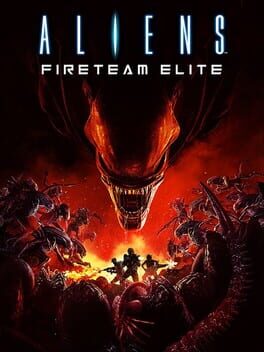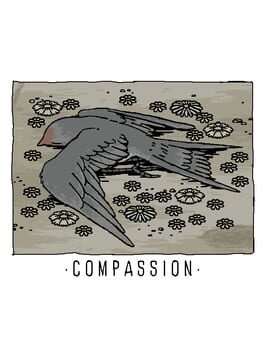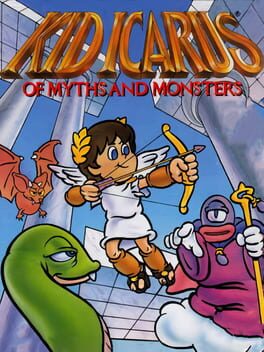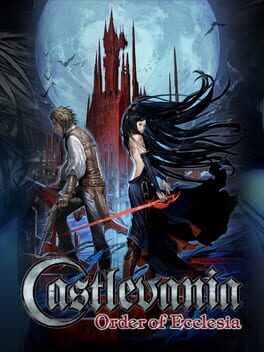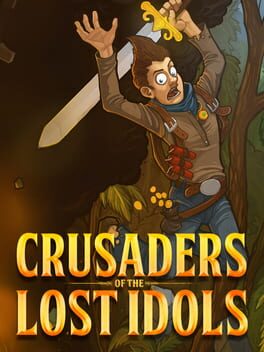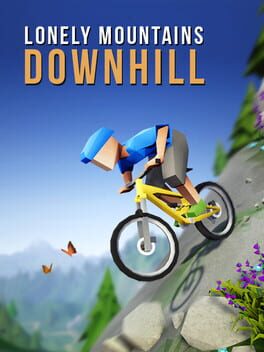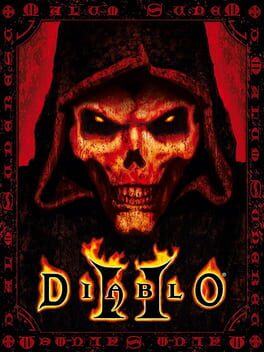internisus
BACKER
35 Reviews liked by internisus
Fatum Betula
2020
some films that came to mind while playing this: spring, summer, fall, winter... and spring (temple of isolation and cycles), little shop of horrors (elder god audrey 2 creation myth), flight of the navigator (quarantine, unidentified floating object), vivarium (suburban alienation)...
there's more, of course, and i'm not suggesting that any of these were necessarily intentional references; rather, it's more likely these are things i'm inferring because the game, short and small as it is, is littered with these little archetypal bits of things both mythical and mundane. i think it's a mistake to take fatum betula as a simple mess of dream logic. it has things to say, and it's up to you to do the experimenting required to discover what these things are. in the end, whichever ending(s) you get, you'll most likely come away with something to think about for a while. the kind of person you want to be, perhaps.
there's more, of course, and i'm not suggesting that any of these were necessarily intentional references; rather, it's more likely these are things i'm inferring because the game, short and small as it is, is littered with these little archetypal bits of things both mythical and mundane. i think it's a mistake to take fatum betula as a simple mess of dream logic. it has things to say, and it's up to you to do the experimenting required to discover what these things are. in the end, whichever ending(s) you get, you'll most likely come away with something to think about for a while. the kind of person you want to be, perhaps.
some radio banter i heard while playing won me over: "the big ones are the ones that come out of people..."
this is solidly... solid? it has absolutely no charm, unlike the cast of aliens, and that seems to be one of the main things yet eluding video games which worship the space military aesthetic of the movie sequel (whereas alien: isolation did a more or less fine job of reaching for the tone and feel of the original film (with a touch of aliens as well)). it's fun 2 blast da xeno, tho. i enjoyed playing the technician and dropping my sentries. mindless. truthfully, though this may be a bit more graphically detailed it's about as stone cold "OK" as terminator: resistance (which also, like, hardly sucks). might play some more in the future, but at the moment i feel very spoiled for excellent games to play and this one stays on the game pass shelf for now
this is solidly... solid? it has absolutely no charm, unlike the cast of aliens, and that seems to be one of the main things yet eluding video games which worship the space military aesthetic of the movie sequel (whereas alien: isolation did a more or less fine job of reaching for the tone and feel of the original film (with a touch of aliens as well)). it's fun 2 blast da xeno, tho. i enjoyed playing the technician and dropping my sentries. mindless. truthfully, though this may be a bit more graphically detailed it's about as stone cold "OK" as terminator: resistance (which also, like, hardly sucks). might play some more in the future, but at the moment i feel very spoiled for excellent games to play and this one stays on the game pass shelf for now
Compassion
2019
i think it's abhorrent that this thing ultimately wants you to smash the bird with a rock. this bird who might be dying, but otherwise appears to be at peace. i've had birds as pets, and even held sick and dying birds in my hands, and i would have never, ever thought to do something as violent as crush them with rocks and sticks.
"getting help isn't making me weak, but refusing it is" says the text bubble, as if these are the bird's final thoughts. i just find it strange and clumsy. who is supposed to benefit from this?
i removed the stick and the rock from my sight and then placed each flower in a crescent around the little bird's face. compassion comes as simply as being there, requiring no bloody "act of mercy" beyond sharing in one's suffering, hoping to bring comfort by doing so. obviously, there are situations where granting a living creature release is the right thing to do, but that all seems outside the scope of this thing. closed the window feeling a mixture of heartache and disgust. i miss my birds.
"getting help isn't making me weak, but refusing it is" says the text bubble, as if these are the bird's final thoughts. i just find it strange and clumsy. who is supposed to benefit from this?
i removed the stick and the rock from my sight and then placed each flower in a crescent around the little bird's face. compassion comes as simply as being there, requiring no bloody "act of mercy" beyond sharing in one's suffering, hoping to bring comfort by doing so. obviously, there are situations where granting a living creature release is the right thing to do, but that all seems outside the scope of this thing. closed the window feeling a mixture of heartache and disgust. i miss my birds.
Deus Ex GO
2016
The Go trilogy comprises some of my favorite puzzle games. While not as charming as Hitman Go or as all-around exquisite as Lara Croft Go, the Deus Ex entry is still a lot of fun. Unfortunately, I didn't replay this game now just because I like it.
I've been playing Hitman 2 (2) recently and its stinky always-online DRM requirement to access many features always gives me pause. I understand its purpose and implementation, and there is still a (neutered) offline mode, but I think it's rather unfortunate for any single-player game to include something like that, especially one that costs money. Lo and behold, a few days ago the DX IP's new owners revealed that, as of January 4th, Deus Ex Go will no longer be playable. This is a single-player game that, while usually only around 99 cents, has a purchasing fee. Though it does have online functionality involving community/seasonal missions, there is absolutely no reason for the main story content to be rendered unplayable at any point. But it seems the DRM was baked in so heavily that it cannot function offline, and unlike the other two Go games, this one was never ported to not-phones ("supposedly" there's a PC port on the Microsoft store but I've never seen it available for sale or even piracy), so it will more or less cease to exist in a little over a month.
I am reminded of the endless runner Spider-Man Unlimited, a game I poured untold hours into and even spent a little bit of money on - I don't think it was necessarily anything great, but I played the shit out of it during a difficult time in my life and it holds a special place in my heart. After a certain point, an app I needed for work caused all my phone games to run terribly, so I put it on hold, and when I tried going back to it after getting a new phone, the servers were gone; another single-player game I very much enjoyed that just cannot be played anymore at all. And then there's the one phone game I truly adore - Another Eden - but every time I think about it playing it, I wonder if I'll ever get to experience most of its content and always back off, because despite being a high quality single-player RPG, it needs the internet to work. The lack of permanence in online DRM-enforced titles goes beyond inducing FOMO or being "anti-consumer," it means some of our favorites may be rendered unplayable in the future, only to be forgotten to the point where they may as well have never existed at all, and that's heartbreaking.
A lot of people probably consider Deus Ex Go a throwaway little thing, and it's certainly not as devastating losing it as it would have been to lose one of the series' main entries, but for me it stings all the same. The terms of service for games always states that publishers are giving us permission to play their games, which they can revoke at any time - that's why you can't redownload PT or play it on the PS5, because Konami doesn't want you to, and you implicitly agreed to that by downloading it in the first place. Is that okay? Are our generation's video games trivial enough to not want to share them with future ones? There can be value in fleeting experiences, certainly, but these decisions are made solely out of viewing games as products rather than art, and that makes me very sad.
I've been playing Hitman 2 (2) recently and its stinky always-online DRM requirement to access many features always gives me pause. I understand its purpose and implementation, and there is still a (neutered) offline mode, but I think it's rather unfortunate for any single-player game to include something like that, especially one that costs money. Lo and behold, a few days ago the DX IP's new owners revealed that, as of January 4th, Deus Ex Go will no longer be playable. This is a single-player game that, while usually only around 99 cents, has a purchasing fee. Though it does have online functionality involving community/seasonal missions, there is absolutely no reason for the main story content to be rendered unplayable at any point. But it seems the DRM was baked in so heavily that it cannot function offline, and unlike the other two Go games, this one was never ported to not-phones ("supposedly" there's a PC port on the Microsoft store but I've never seen it available for sale or even piracy), so it will more or less cease to exist in a little over a month.
I am reminded of the endless runner Spider-Man Unlimited, a game I poured untold hours into and even spent a little bit of money on - I don't think it was necessarily anything great, but I played the shit out of it during a difficult time in my life and it holds a special place in my heart. After a certain point, an app I needed for work caused all my phone games to run terribly, so I put it on hold, and when I tried going back to it after getting a new phone, the servers were gone; another single-player game I very much enjoyed that just cannot be played anymore at all. And then there's the one phone game I truly adore - Another Eden - but every time I think about it playing it, I wonder if I'll ever get to experience most of its content and always back off, because despite being a high quality single-player RPG, it needs the internet to work. The lack of permanence in online DRM-enforced titles goes beyond inducing FOMO or being "anti-consumer," it means some of our favorites may be rendered unplayable in the future, only to be forgotten to the point where they may as well have never existed at all, and that's heartbreaking.
A lot of people probably consider Deus Ex Go a throwaway little thing, and it's certainly not as devastating losing it as it would have been to lose one of the series' main entries, but for me it stings all the same. The terms of service for games always states that publishers are giving us permission to play their games, which they can revoke at any time - that's why you can't redownload PT or play it on the PS5, because Konami doesn't want you to, and you implicitly agreed to that by downloading it in the first place. Is that okay? Are our generation's video games trivial enough to not want to share them with future ones? There can be value in fleeting experiences, certainly, but these decisions are made solely out of viewing games as products rather than art, and that makes me very sad.
the rare game boy sequel to an nes game that actually fully preserves the tone and feel of the original and in fact is just a straight-up attempt to refine what came before. a commendable and not at all unsuccessful attempt, but it's also just the slightest bit boring for it. the original delighted in surprising and toying with the player's expectations - if any nes title warranted a wacky and out-there handheld sequel, it was that one.
definitely a higher tier castlevania but i’m still a bit mixed on it. feels a little too stuck between worlds for me. it takes half-steps towards preserving both the tightly designed combat encounters of classicvania and the free-form exploration of igavania, but in doing so fails to fully succeed at either and ends up feeling just the tiniest bit ill-conceived. frankly i just prefer it when games pick one core goal to focus their attention at trying to fulfill instead of stretching themselves thin trying to achieve everything at once. i also think it's funny how much more emphasized the narrative is in IGA's entries when i find them by and large to be way less successful in that regard compared to the rest of the series. symphony and aria worked because they were so heavily steeped in the series lore and mythology, illuminating intriguing details about the overarching narrative while at once subverting the archetypal plot these games tended to serve. excluding those two, though, every other game helmed by IGA has featured snoozefest plotlines that feel completely inconsequential, and we're really scraping the bottom of the barrel by this point; ecclesia being the focus here is the equivalent of those third-rate comic book heroes that the marvel cinematic universe keeps trying to push because they've exhausted all of the actually significant characters in their canon but have to keep the money machine going somehow. try as it might, i remain totally unconvinced that i should care about any of this – that is, with the exception of shanoa, who’s actually really cool and among the best protags this series has seen. but one good character does not a good story make.
i’ve been quite harsh on this game so far but my score speaks for itself, this is ultimately a rather good game. the glyph system is interesting, probably the best gimmick mechanic these games have tried to implement, the way MP works is clever (sort of prophetic, even, with demon’s souls coming out the year after), and the combat tests your skills in a way that this series hasn’t really attempted to since rondo. though i think there’s quite a bit of variance in how good the encounters here are, this overall has the best pantheon of bosses in the series by quite a margin - not just from a mechanical overview but also a presentational one; highlights include shanoa's hilariously soft-spoken “go to hell 😊” before she dumps an entire elevator on that fucking crab boss, and [spoiler]’s deranged cackling when flying through the air at mach 10 speed. also has easily the best drac fight in the series but to be fair the bar for that is on the floor.
i’ve been quite harsh on this game so far but my score speaks for itself, this is ultimately a rather good game. the glyph system is interesting, probably the best gimmick mechanic these games have tried to implement, the way MP works is clever (sort of prophetic, even, with demon’s souls coming out the year after), and the combat tests your skills in a way that this series hasn’t really attempted to since rondo. though i think there’s quite a bit of variance in how good the encounters here are, this overall has the best pantheon of bosses in the series by quite a margin - not just from a mechanical overview but also a presentational one; highlights include shanoa's hilariously soft-spoken “go to hell 😊” before she dumps an entire elevator on that fucking crab boss, and [spoiler]’s deranged cackling when flying through the air at mach 10 speed. also has easily the best drac fight in the series but to be fair the bar for that is on the floor.
Signalis
2022
concerning the bones of the game i'm of two minds: signalis avoids puzzle scenarios that end up having me running back and forth wondering what the fuck i'm missing, which is something that tends to interfere with my enjoyment of the older resident evils—though it's also perhaps straightforward to a fault. the puzzles are refreshing in their cleverness, though they will most likely seem a bit too easy to some, and the navigation of each section never even begins to confuse.
my rating is maybe a bit generous, but i don't really care. i'm actually restraining myself, being honest. the presentation and vibes are immaculate. familiar survival horror dosed with traces of BLAME!, nier: automata, blade runner, a little alien 3 (strictly in the bleak feel of its setting), the shining, etc., all steeped in the cosmic horror of otherworldly malevolence plaguing this post-singularity world of ruin. it is by turns coldly alienating and dreamily sapphic. everything feels solid and tactile—this is a game crafted with care, and it feels like it has the integrity of a ps1 or mid '90s pc game with more modern interface and sound design. there's tech everywhere that you want to touch, and it reminded me a lot of alien: isolation in that regard.
signalis is suuuper comfy, and i guess i could be irritated that it never really scared or challenged me, but... again, i don't really care. i just loved being in this haunted sci-fi world.
my rating is maybe a bit generous, but i don't really care. i'm actually restraining myself, being honest. the presentation and vibes are immaculate. familiar survival horror dosed with traces of BLAME!, nier: automata, blade runner, a little alien 3 (strictly in the bleak feel of its setting), the shining, etc., all steeped in the cosmic horror of otherworldly malevolence plaguing this post-singularity world of ruin. it is by turns coldly alienating and dreamily sapphic. everything feels solid and tactile—this is a game crafted with care, and it feels like it has the integrity of a ps1 or mid '90s pc game with more modern interface and sound design. there's tech everywhere that you want to touch, and it reminded me a lot of alien: isolation in that regard.
signalis is suuuper comfy, and i guess i could be irritated that it never really scared or challenged me, but... again, i don't really care. i just loved being in this haunted sci-fi world.
Super Mario 64
1996
One can't overstate the historical impact of Super Mario 64. Its analog-stick controls and adjustable camera set the stage for 21st century gaming. Its 3D platforming has as many imitators as a mid-1960s Beatles album. And there's still nothing like the surreal invitation to stretch the features of Mario's big face before the game even starts.
But I still hesitate to call Mario 64 great. Once you acknowledge the major leap in presentation and get over the thrill of moving in three-dimensional space, you're left with a Mario that overemphasizes the collection of items in levels that you must play to death. Before Mario 64, Mario games had a momentum to them. Mario 64 feels more like a scavenger hunt without stakes. There's little urgency or pressure. By the halfway point, I'm already disinterested.
And whatever happened to the creative thinking behind Mario's abilities? The conservatism started with Super Mario World, which merely updated how the hero can fly and gave him a gimmicky dinosaur buddy. In Mario 64, the most notable addition is the expanded repertoire of jumps, but let's not forget this more acrobatic style already showed up in the greatest remake of all time, Donkey Kong 1994. The effects of the special caps in Mario 64 don't spark my imagination: another flying ability and two passive abilities, one of which corrects the stupid regressive rule that Mario can't breathe underwater. It's almost as if 1990s Nintendo threw up its hands after conceiving the wide array of game-changing powers in Super Mario Bros. 3 and Yoshi's Island.
I also despise Mario 64's patronizing, one-dimensional tone. This is a case where the massive influence of Mario 64 has short-circuited the gaming world's memory of what pop games could achieve emotionally. No matter the stage, Mario hoots like he just won the lottery as he jumps about. This creative decision smacks of the condescension Nintendo trotted out with the smiling clouds in the remakes within Super Mario All-Stars. It's clear Nintendo stopped trusting the emotional reactions of its audience with the release of Mario 64. Now people expect to hear the cute yelps and get showered with praise for finding a star under a rock. Would our tails no longer wag without these features?
But I still hesitate to call Mario 64 great. Once you acknowledge the major leap in presentation and get over the thrill of moving in three-dimensional space, you're left with a Mario that overemphasizes the collection of items in levels that you must play to death. Before Mario 64, Mario games had a momentum to them. Mario 64 feels more like a scavenger hunt without stakes. There's little urgency or pressure. By the halfway point, I'm already disinterested.
And whatever happened to the creative thinking behind Mario's abilities? The conservatism started with Super Mario World, which merely updated how the hero can fly and gave him a gimmicky dinosaur buddy. In Mario 64, the most notable addition is the expanded repertoire of jumps, but let's not forget this more acrobatic style already showed up in the greatest remake of all time, Donkey Kong 1994. The effects of the special caps in Mario 64 don't spark my imagination: another flying ability and two passive abilities, one of which corrects the stupid regressive rule that Mario can't breathe underwater. It's almost as if 1990s Nintendo threw up its hands after conceiving the wide array of game-changing powers in Super Mario Bros. 3 and Yoshi's Island.
I also despise Mario 64's patronizing, one-dimensional tone. This is a case where the massive influence of Mario 64 has short-circuited the gaming world's memory of what pop games could achieve emotionally. No matter the stage, Mario hoots like he just won the lottery as he jumps about. This creative decision smacks of the condescension Nintendo trotted out with the smiling clouds in the remakes within Super Mario All-Stars. It's clear Nintendo stopped trusting the emotional reactions of its audience with the release of Mario 64. Now people expect to hear the cute yelps and get showered with praise for finding a star under a rock. Would our tails no longer wag without these features?
this remains the best idle/incremental game i've ever played. completely free (the things you can pay for are things you can, 99% of the time, get in the game yourself, and are such a small boost that you're not even really incentivized to buy them. i sure never did) and has thousands of hours of content.
of course, that's mostly idling content, but the design of this game provides a really perfect blend of "idling" and "active participation." the game has a pretty simple setup–you run the game progressing through area to area, using in-game currency to recruit crusaders and place them in your formation, and then using that same currency to upgrade them with new abilities. once you reach a point you can't go any farther in a route, you reset, collect "idols", which can be spent on permanent buffs and naturally provide a buff in themselves (hence fueling the main incremental progress), and then you start a new run, unlocking your crusaders again and their upgrades (though gear maintains, providing a permanent boost for a crusader). so.. pretty typical for an idle game. what makes it so good, then?
well, diversity mostly. currently, the game has countless crusaders with tons of different abilities, and deciding what to use at any given time requires a lot of thought. the abilities themselves are usually pretty complex and heavily depend on position. as well, many crusaders use up the same "slot" in your list, meaning two crusaders of the same slot can't be used at the same time–and, of course, the formation has a limited amount of space. managing your formation and maximizing your dps, gold gain, and other elements is really what keeps the challenge rolling–every new crusader, every new upgrade, every new piece of loot provides a new element that you can consider in terms of making a "perfect" formation.
another thing that livens up the game is its use of countless challenges, which usually feature special rules (a limited character pool, a limited number of slots in the formation, or some other difficult to mitigate feature)–most of them reward rubies, which is a not-so-important added currency for certain things, but the real draw is when you get to events. events provide an innumerable amount of added challenges, which themselves may allow you to earn new crusaders and new skins, going up in certain tiers. these events rotate yearly with new tiers and crusaders available each time, meaning there's no way to miss out on a crusader. if you happen to miss an event, it'll be back–and even then, there are alternative ways to earn crusaders–and all of this is possible without paying real money.
the game continues to improve in terms of balance and features. when i last left off, skins started to become an exciting new element in the game, with some skins even changing the tags on certain crusaders (for instance, one skin may turn a human character into a plant character), and due to how many abilities depend on these skins, this provides another new aspect of how to perfect your formation. from what i saw there was a strong level of feedback, with the developers continuing to hold weekly q&a's where they discuss new features, speak with the audience about what they want to be changed, and then.. y'know.. actually do it!
there's surprisingly a lot to talk about when it comes to this game–there's a lot i haven't even really mentioned, such as how legendary gear works, how idols work, how the game maintains its interest even with so many resets.. but hey, you can play it yourself to find out! i had nearly 7000 hours in this game before i stopped, and i only really stopped because my computer didn't seem to handle it well, something which seems to be my fault rather than the game's. if you want an idle game you can stick with for multiple years and still find something new to enjoy and new goals to reach, i really can't recommend this game enough.
of course, that's mostly idling content, but the design of this game provides a really perfect blend of "idling" and "active participation." the game has a pretty simple setup–you run the game progressing through area to area, using in-game currency to recruit crusaders and place them in your formation, and then using that same currency to upgrade them with new abilities. once you reach a point you can't go any farther in a route, you reset, collect "idols", which can be spent on permanent buffs and naturally provide a buff in themselves (hence fueling the main incremental progress), and then you start a new run, unlocking your crusaders again and their upgrades (though gear maintains, providing a permanent boost for a crusader). so.. pretty typical for an idle game. what makes it so good, then?
well, diversity mostly. currently, the game has countless crusaders with tons of different abilities, and deciding what to use at any given time requires a lot of thought. the abilities themselves are usually pretty complex and heavily depend on position. as well, many crusaders use up the same "slot" in your list, meaning two crusaders of the same slot can't be used at the same time–and, of course, the formation has a limited amount of space. managing your formation and maximizing your dps, gold gain, and other elements is really what keeps the challenge rolling–every new crusader, every new upgrade, every new piece of loot provides a new element that you can consider in terms of making a "perfect" formation.
another thing that livens up the game is its use of countless challenges, which usually feature special rules (a limited character pool, a limited number of slots in the formation, or some other difficult to mitigate feature)–most of them reward rubies, which is a not-so-important added currency for certain things, but the real draw is when you get to events. events provide an innumerable amount of added challenges, which themselves may allow you to earn new crusaders and new skins, going up in certain tiers. these events rotate yearly with new tiers and crusaders available each time, meaning there's no way to miss out on a crusader. if you happen to miss an event, it'll be back–and even then, there are alternative ways to earn crusaders–and all of this is possible without paying real money.
the game continues to improve in terms of balance and features. when i last left off, skins started to become an exciting new element in the game, with some skins even changing the tags on certain crusaders (for instance, one skin may turn a human character into a plant character), and due to how many abilities depend on these skins, this provides another new aspect of how to perfect your formation. from what i saw there was a strong level of feedback, with the developers continuing to hold weekly q&a's where they discuss new features, speak with the audience about what they want to be changed, and then.. y'know.. actually do it!
there's surprisingly a lot to talk about when it comes to this game–there's a lot i haven't even really mentioned, such as how legendary gear works, how idols work, how the game maintains its interest even with so many resets.. but hey, you can play it yourself to find out! i had nearly 7000 hours in this game before i stopped, and i only really stopped because my computer didn't seem to handle it well, something which seems to be my fault rather than the game's. if you want an idle game you can stick with for multiple years and still find something new to enjoy and new goals to reach, i really can't recommend this game enough.
Ico
2001
You are never once told what to do. There are no directions, no tutorials. You figure it all out in an organic way, using the architectural design of your environment and the framing of the camera to navigate the castle.
And the castle... There has never been a more elegantly designed level in a video game. The fixed camera angles that allow you to pan around and look at your surroundings give it a genuine sense of presence and scale. It feels like a real place that was once lived in due to its interconnected and functional design. The feeling of just being there is, in terms of sheer atmospheric power, unmatched in any game. All of this despite the environment being so austere and existing purely for Ico to lead Yorda through.
I've seen it pointed out before that Yorda is simply the typical video game damsel in distress, as she is saved by the player and literally dragged around and protected for the entirety of the game. This is true, but simply identifying tropes isn't substantive criticism; in this case, it's a shallow observation that misses the point entirely.
Yorda grew up in a cage. The entire purpose of her existence is to be an eventual vessel for her mother. She never expresses agency because she has never known it. But after making her first real human connection with someone, a person who knows freedom and only now has had it taken away, she learns how to be her own person. In the end, when Ico is unable to go on (and control is thus taken from the player), she takes the initiative to save him herself and assert her right to be free. There has never been a more thematically powerful use of a cutscene in any game, before or since.
It's an empowering story about becoming a human being, all told with almost no dialogue and through the language of video games. It is possibly the purest example of using this medium to tell a good story. Ueda really is one of the very few real artists in the industry and this game will stand forever as one of the most important milestones for video games.
Probably the worst cover art of all time in the NA version though.
And the castle... There has never been a more elegantly designed level in a video game. The fixed camera angles that allow you to pan around and look at your surroundings give it a genuine sense of presence and scale. It feels like a real place that was once lived in due to its interconnected and functional design. The feeling of just being there is, in terms of sheer atmospheric power, unmatched in any game. All of this despite the environment being so austere and existing purely for Ico to lead Yorda through.
I've seen it pointed out before that Yorda is simply the typical video game damsel in distress, as she is saved by the player and literally dragged around and protected for the entirety of the game. This is true, but simply identifying tropes isn't substantive criticism; in this case, it's a shallow observation that misses the point entirely.
Yorda grew up in a cage. The entire purpose of her existence is to be an eventual vessel for her mother. She never expresses agency because she has never known it. But after making her first real human connection with someone, a person who knows freedom and only now has had it taken away, she learns how to be her own person. In the end, when Ico is unable to go on (and control is thus taken from the player), she takes the initiative to save him herself and assert her right to be free. There has never been a more thematically powerful use of a cutscene in any game, before or since.
It's an empowering story about becoming a human being, all told with almost no dialogue and through the language of video games. It is possibly the purest example of using this medium to tell a good story. Ueda really is one of the very few real artists in the industry and this game will stand forever as one of the most important milestones for video games.
Probably the worst cover art of all time in the NA version though.
https://twitter.com/w_guppy/status/1382287033838792707?s=19
i can't rightly say if it's simply a case of my absence from games due to academic obligation or what over the course of the past month, but lonely mountains is just superbly refreshing and taut, something like petrichor for my self-imposed exodus. sure, you'll still be made to do challenges and deal with progression for epic customization but at least the title is never abrasive about it. instead with precision cycling you make your way down several serene mountains, at first as a wayward explorer and later as an adrenaline junkie carving the most efficient routes down the mountain possible. the soundscape is ambient and sparse in the best possible way, with these rendered environments coming across as painterly; little splashes of colour and brushstrokes serve to implicitly guide the eye towards where the next shortcut might be. the camera rides in tow, giving players a perspective of how vast and beautiful these biomes are while also contributing greatly to both thrill and discovery. and there's even joy in failure, as dashing your intrepid cyclist against the rocks often leads to some good ol' ragdolling goofs. just the perfect game to wake up to with a cup of coffee
of the games ive played this year, the most similar analogues are a short hike and descenders; it goes without saying that im currently enjoying my time with this little beaut so much more than those. bliss
i can't rightly say if it's simply a case of my absence from games due to academic obligation or what over the course of the past month, but lonely mountains is just superbly refreshing and taut, something like petrichor for my self-imposed exodus. sure, you'll still be made to do challenges and deal with progression for epic customization but at least the title is never abrasive about it. instead with precision cycling you make your way down several serene mountains, at first as a wayward explorer and later as an adrenaline junkie carving the most efficient routes down the mountain possible. the soundscape is ambient and sparse in the best possible way, with these rendered environments coming across as painterly; little splashes of colour and brushstrokes serve to implicitly guide the eye towards where the next shortcut might be. the camera rides in tow, giving players a perspective of how vast and beautiful these biomes are while also contributing greatly to both thrill and discovery. and there's even joy in failure, as dashing your intrepid cyclist against the rocks often leads to some good ol' ragdolling goofs. just the perfect game to wake up to with a cup of coffee
of the games ive played this year, the most similar analogues are a short hike and descenders; it goes without saying that im currently enjoying my time with this little beaut so much more than those. bliss
Wordle
2021
Wordle
2021
I've got a lot of respect for games that produce a lot of joy out of a tiny ruleset. Threes and Agar.io come to mind.
Unlike those, it's obvious that the act of playing Wordle is mostly secondary to the fun of sharing your scores, though. Hard to assign an exact number of stars to the mild pleasant feeling of getting these predictable, almost-but-not-completely-informationless status updates from all your good friends every morning. I too am glad to know you're okay, guys, and that you are still good at knowing English.
So uh let's call it 3 outta 5.
Unlike those, it's obvious that the act of playing Wordle is mostly secondary to the fun of sharing your scores, though. Hard to assign an exact number of stars to the mild pleasant feeling of getting these predictable, almost-but-not-completely-informationless status updates from all your good friends every morning. I too am glad to know you're okay, guys, and that you are still good at knowing English.
So uh let's call it 3 outta 5.
Diablo II
2000
A supreme single player experience that eventually devolved into a completely bastardized online shitshow. Act rushing, Baal running, item duping, "forum gold", trade scamming - it's these things make up the core of the absolutely soulless collective memory of D2, fossilized into place by people who got hopelessly addicted to a game that exhausted itself ages ago, increasingly trying to find ways to not actually play the game and instead just optimize their dopamine hits through whatever means necessary. No wonder nobody has managed to quite get it right again - in one way or another, almost every ARPG has been trying to copy the parts that went horribly wrong.
If you're playing through it for the first time today, or at least for the first time in some 20 years, tho? Still unmatched.
"Sisters... there was no other way."
If you're playing through it for the first time today, or at least for the first time in some 20 years, tho? Still unmatched.
"Sisters... there was no other way."

